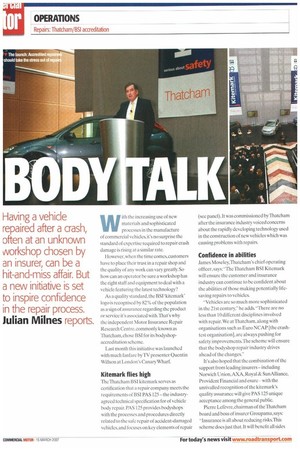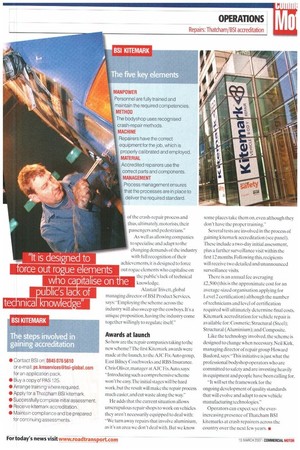Having a vehicle repaired after a crash, often at an
Page 60

Page 61

If you've noticed an error in this article please click here to report it so we can fix it.
unknown workshop chosen by an insurer, can be a hit-and-miss affair. But a new initiative is set to inspire confidence in the repair process.
Julian Milnes reports.
With the increasing use of new materials and sophisticated processes in the manufacture of commercial vehicles, it's no surprise the standard of expertise required to repair crash damage is rising at a similar rate.
However, when the time comes, customers have to place their trust in a repair shop and the quality of any work can vary greatly. So how can an operator be sure a workshop has the right staff and equipment to deal with a vehicle featuring the latest technology?
As a quality standard, the BSI 'kitemark' logo is recognised by 82% of the population as a sign of assurance regarding the product or service it's associated with.That's why the independent Motor Insurance Repair Research Centre, comm only known as Thatcham, chose BSI for its bodyshopaccreditation scheme.
Last month this initiative was launched with much fanfare by TV presenter Quentin Willson at London's Canary Wharf.
Kitemark flies high
The Thatcham BSI kitemark serves as certification that a repair company meets the requirements of BSI PAS 125— the industryagreed technical specification for of vehicle body repair. PAS 125 provides bodyshops with the processes and procedures directly related to the safe repair of accident-damaged vehicles, and focuses on key elements of repair (see panel). It was commissioned by Thatcham after the insurance industry voiced concerns about the rapidly developing technology used in the construction of new vehicles which was causing problems with repairs.
Confidence in abilities
James Moseley,Thatcham's chief operating officer, says: "The Thatcham BSI Kitemark will ensure the customer and insurance industry can continue to be confident about the abilities of those making potentially lifesaving repairs to vehicles.
"Vehicles are so much more sophisticated in the 21st century," he adds. "There are no less than 10 different disciplines involved with repair. We at Thatcham, along with organisations such as Euro NCAP [the crashtest organisation], are always pushing for safety improvements.'lle scheme will ensure that the bodyshop repair industry drives ahead of the changes."
It's also hoped that the combination of the support from leading insurers— including Norwich Union,AXA, Royal & SunAlliance, Provident Financial and esure— with the unrivalled recognition of the kitemark's quality assurance will give PAS 125 unique acceptance among the general public.
Pierre Lefevre, chairman of the Thatcham hoard and boss of insurer Groupama,says: "Insurance is all about reducing risks.This scheme does just that. It will benefit all sides of the crash-repair process and thus, ultimately, motorists, their passengers and pedestrians."
As well as allowing companies to specialise and adapt to the changing demands of the industry with full recognition of their achievements, it is designed to force out. ogue elements who capitalise on the public's lack of technical knowledge.
AlastairTrivett, global managing director of BSI Product Services, says: Employing the scheme across the industry will also sweep up the cowboys. It's a unique proposition, having the industry come together willingly to regulate itself."
Awards at launch So how are the repair companies taking to the new scheme?The first Kitemark awards were made at the launch, to the AJC Fix Auto group, East Bilney Coachworks and RBS Insurance. Chris Oliver. manager at AJC Fix Auto, says: -Introducing such a comprehensive scheme won't be easy.The initial stages will be hard work, but the result will make the repair process much easier, and cut waste along the way" He adds that the current situation allows unscrupulous repair shops to work on vehicles they aren't necessarily equipped to deal with: "We turn away repairs that involve aluminium, as its an area we don't deal with. But we know some places take them on,even although they don't have the proper training."
Several tests are involved in the process of gaining kitemark accreditation (see panel). These include a two-day initial assessment, plus a further surveillance visit within the first 12 months. Following this, recipients will receive two detailed and unannounced surveillance visits.
There is an annual fee averaging £2,500 (this is the approximate cost for an average-sized organisation applying for Level 2 certification) although the number of technicians and level of certification required will ultimately determine final costs. Kitemark accreditation for vehicle repair is available for: Cosmetic; Structural (Steel); Structural (Aluminium ); and Composite.
Like the technology involved, the scheme is designed to change when necessary. Neil Kirk, managing director of repair group Howard Basford,says:-This initiative is just what the professional bodyshop operators who are committed to safety and are investing heavily in equipment and people have been calling for.
"It will set the framework for the ongoing development of quality standards that will evolve and adapt to new vehicle manufacturing technologies."
Operators can expect see the everincreasing presence ofThatcham BSI kit emarks at crash repairers across the country over the next few years. •


























































































































































































